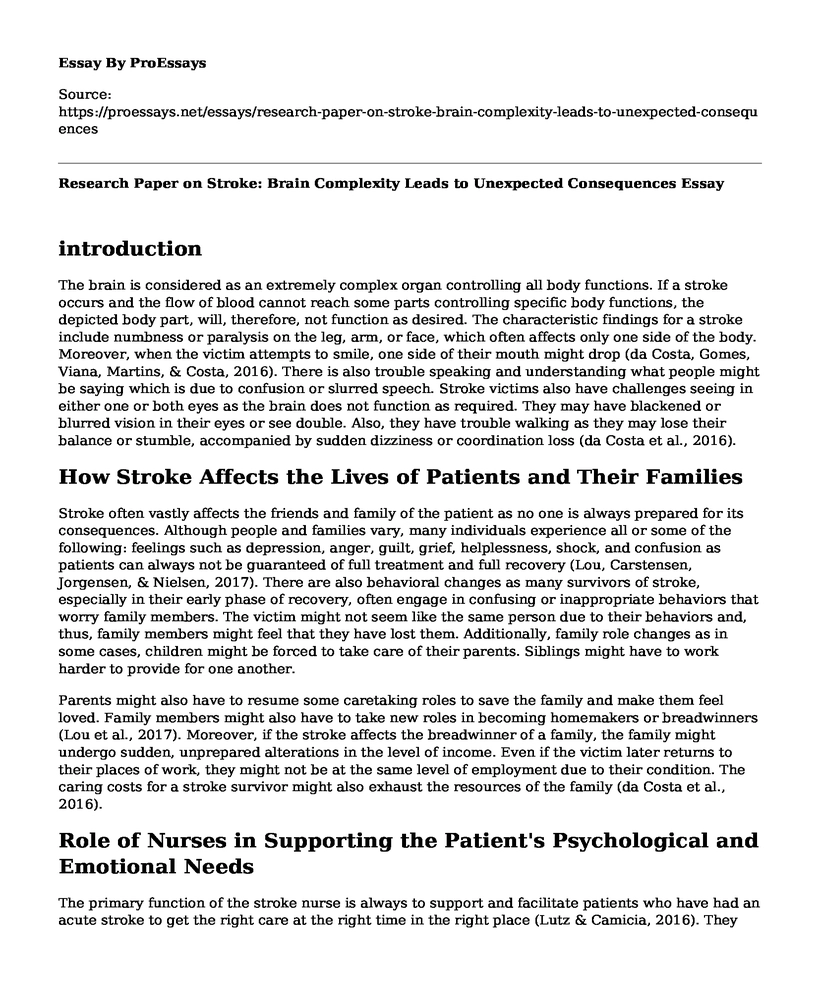introduction
The brain is considered as an extremely complex organ controlling all body functions. If a stroke occurs and the flow of blood cannot reach some parts controlling specific body functions, the depicted body part, will, therefore, not function as desired. The characteristic findings for a stroke include numbness or paralysis on the leg, arm, or face, which often affects only one side of the body. Moreover, when the victim attempts to smile, one side of their mouth might drop (da Costa, Gomes, Viana, Martins, & Costa, 2016). There is also trouble speaking and understanding what people might be saying which is due to confusion or slurred speech. Stroke victims also have challenges seeing in either one or both eyes as the brain does not function as required. They may have blackened or blurred vision in their eyes or see double. Also, they have trouble walking as they may lose their balance or stumble, accompanied by sudden dizziness or coordination loss (da Costa et al., 2016).
How Stroke Affects the Lives of Patients and Their Families
Stroke often vastly affects the friends and family of the patient as no one is always prepared for its consequences. Although people and families vary, many individuals experience all or some of the following: feelings such as depression, anger, guilt, grief, helplessness, shock, and confusion as patients can always not be guaranteed of full treatment and full recovery (Lou, Carstensen, Jorgensen, & Nielsen, 2017). There are also behavioral changes as many survivors of stroke, especially in their early phase of recovery, often engage in confusing or inappropriate behaviors that worry family members. The victim might not seem like the same person due to their behaviors and, thus, family members might feel that they have lost them. Additionally, family role changes as in some cases, children might be forced to take care of their parents. Siblings might have to work harder to provide for one another.
Parents might also have to resume some caretaking roles to save the family and make them feel loved. Family members might also have to take new roles in becoming homemakers or breadwinners (Lou et al., 2017). Moreover, if the stroke affects the breadwinner of a family, the family might undergo sudden, unprepared alterations in the level of income. Even if the victim later returns to their places of work, they might not be at the same level of employment due to their condition. The caring costs for a stroke survivor might also exhaust the resources of the family (da Costa et al., 2016).
Role of Nurses in Supporting the Patient's Psychological and Emotional Needs
The primary function of the stroke nurse is always to support and facilitate patients who have had an acute stroke to get the right care at the right time in the right place (Lutz & Camicia, 2016). They also educate friends and family members of the stroke patient on ways of taking care of and understanding them after they have been discharged so that they do not feel lonely and to enhance their recovery process. Also, nurses should be friendly and encourage the patients to talk about their worries and fears so that they feel less anxious when interacting with their loved ones (Lutz & Camicia, 2016).
References
da Costa, T. F., Gomes, T. M., Viana, L. R., Martins, K. P., & Costa, K. N. (2016). Stroke: patient characteristics and quality of life of caregivers. Rev Bras Enferm, 69(5), 933-939. Retrieved from https://www.redalyc.org/pdf/2670/267047824017_2.pdf
Lou, S., Carstensen, K., Jorgensen, C. R., & Nielsen, C. P. (2017). Stroke patients' and informal carers' experiences with life after stroke: An overview of systematic qualitative reviews. Disability and Rehabilitation, 39(3), 301-313.DOI: 10.3109/09638288.2016.1140836
Lutz, B. J., & Camicia, M. (2016). Supporting the needs of stroke caregivers across the care continuum. JCOM, 23(12), 557-66. Retrieved from https://pdfs.semanticscholar.org/3e84/0bde8b9f105a279e8bf03b15537e722684cd.pdf
Cite this page
Research Paper on Stroke: Brain Complexity Leads to Unexpected Consequences. (2023, Mar 26). Retrieved from https://proessays.net/essays/research-paper-on-stroke-brain-complexity-leads-to-unexpected-consequences
If you are the original author of this essay and no longer wish to have it published on the ProEssays website, please click below to request its removal:
- Directional Strategies
- Group Protocol Assignment: Dealing With Physical Disability in Older Adults in the Long-Term Rehab
- Non-Pharmacological Treatment of Atrial Fibrillation and the Appropriate Management
- Community Healthcare Issues Paper Example
- Essay Sample on Cancer: Abnormal Cell Growth Leading to Tumor Formation
- HIPAA: Protecting Patient Privacy in Healthcare Settings - Essay Sample
- Essay Example on Abortion: A Wrong Act Except in Certain Instances







